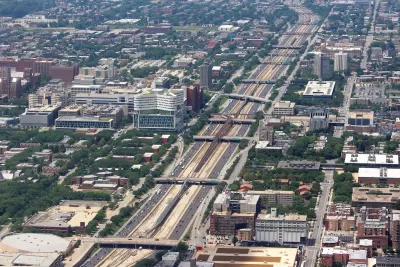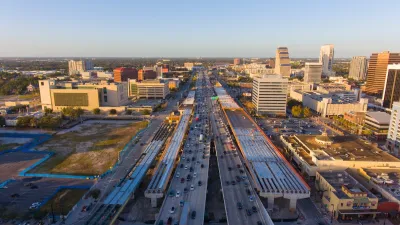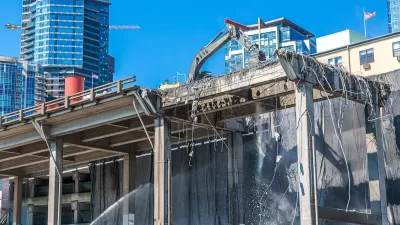Community advocates say the city’s plan may not do enough to reverse the negative impacts of a major expressway.

The City of Chicago announced it received a $2 million federal Reconnecting Communities grant aimed at improving “community safety, cohesion, and quality of life through enhanced connectivity over and around the [Eisenhower Expressway],” according to a press release from the city.
In an article for Streetsblog Chicago, John Greenfield describes the city’s plans for the Interstate 290 corridor, which are light on details but include “improvements for people walking and bicycling on existing streets and paths surrounding and crossing the corridor, adding or enhancing pedestrian bridges and bicycle facilities.”
In response, Kyle Lucas, cofounder of nonprofit Better Streets Chicago, said the grant is a positive step. “However, this fails to address IDOT’s plans to widen I-290 further. $2 million for a few bike lanes, pedestrian bump outs, and bushes on top of yet another multi-billion-dollar highway expansion project will do little to address either the historical nor ongoing harms that highways impose.” Lucas adds, “Our leaders must get serious about investing in expanding and modernizing transit – like extending the Blue Line – instead of doubling down on the planning mistakes of the '50s.”
FULL STORY: City announces $2M federal grant to address harms caused by I-290 by improving walk/bike/transit access

Maui's Vacation Rental Debate Turns Ugly
Verbal attacks, misinformation campaigns and fistfights plague a high-stakes debate to convert thousands of vacation rentals into long-term housing.

Planetizen Federal Action Tracker
A weekly monitor of how Trump’s orders and actions are impacting planners and planning in America.

In Urban Planning, AI Prompting Could be the New Design Thinking
Creativity has long been key to great urban design. What if we see AI as our new creative partner?

Pedestrian Deaths Drop, Remain Twice as High as in 2009
Fatalities declined by 4 percent in 2024, but the U.S. is still nowhere close to ‘Vision Zero.’

King County Supportive Housing Program Offers Hope for Unhoused Residents
The county is taking a ‘Housing First’ approach that prioritizes getting people into housing, then offering wraparound supportive services.

Researchers Use AI to Get Clearer Picture of US Housing
Analysts are using artificial intelligence to supercharge their research by allowing them to comb through data faster. Though these AI tools can be error prone, they save time and housing researchers are optimistic about the future.
Urban Design for Planners 1: Software Tools
This six-course series explores essential urban design concepts using open source software and equips planners with the tools they need to participate fully in the urban design process.
Planning for Universal Design
Learn the tools for implementing Universal Design in planning regulations.
planning NEXT
Appalachian Highlands Housing Partners
Mpact (founded as Rail~Volution)
City of Camden Redevelopment Agency
City of Astoria
City of Portland
City of Laramie





























